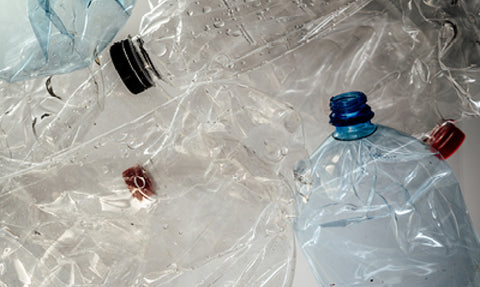At WASH WILD we are committed to taking care of nature and our environment. Not only is it important for our health, but it is also a significant responsibility that we have as a small business in protecting the future of our planet. With this in mind, we have taken great care in making conscious and responsible decisions on how to best package our products.
We have experimented with glass and while it does suit some applications, we found the risk of breakage too high and potentially dangerous especially in high traffic areas like the kitchen, laundry and bathroom.
We choose not to use soft pouch refills as this packaging is not fully recyclable, meaning it ends up in landfill with estimated decomposition times between 250-500 years. Pouches durable enough to hold our products would require inner linings rendering them impossible to recycle and even those that claim to be reusable have a finite lifespan that ultimately sees them thrown away.
One of the most common packaging materials available is a type of plastic resin called PET, or polyethylene terephthalate – it is indicated by the number 1 in the chasing arrows symbol. It is made from crude oil and petrochemicals – fossil fuels extracted from the earth. It is used for drink bottles, water bottles, food and cleaning product containers, amongst many other things. This highly versatile product is lightweight reducing transport costs, but strong and resilient making it reliable and suitable for multiple applications. It can however take more than 700 years to breakdown in landfill.
The annual production of plastic bottles is now estimated at half a trillion. Over one million plastic bottles are bought around the world every minute. That’s 20,000 every second with usage expected to quadruple by 2050. This spiralling consumption is fed by a ‘linear economy’, where resources are extracted, a product is manufactured, used, then disposed. One million tonnes of Australia’s annual plastic consumption is single-use plastic. Items that are made without consideration for its end of life, led by a throw-away culture, cause forest destruction, disruption to waterways, increased pollution and the release of toxic substances.
A shift towards a ‘circular economy’ where products and resources are kept in use mimics a more natural cycle of regeneration. This system reduces waste and includes repair or recycling options, considering the entire life cycle of a product from its inception.
The next generation in plastic production is rPET – recycled PET. Discarded PET containers have labels removed, they are thoroughly washed through multiple processes then the plastic is ground to create ‘flakes’ or pelletised plastic which can be efficiently transported for re-manufacturing. Typically, PET containers can be recycled into new containers between two and four times then further recycled into countless other materials such as insulation, blankets, upholstery, stuffing – anything that is made of polyester can use rPET.
All WASH WILD packaging is rPET with a number of products available in bulk refill sizes to reduce plastic usage and the environmental cost of shipping. These small choices shift the use of plastic from ‘take, make and waste’ to one that keeps it circulating as an infinite resource, with the potential to be repurposed indefinitely.


